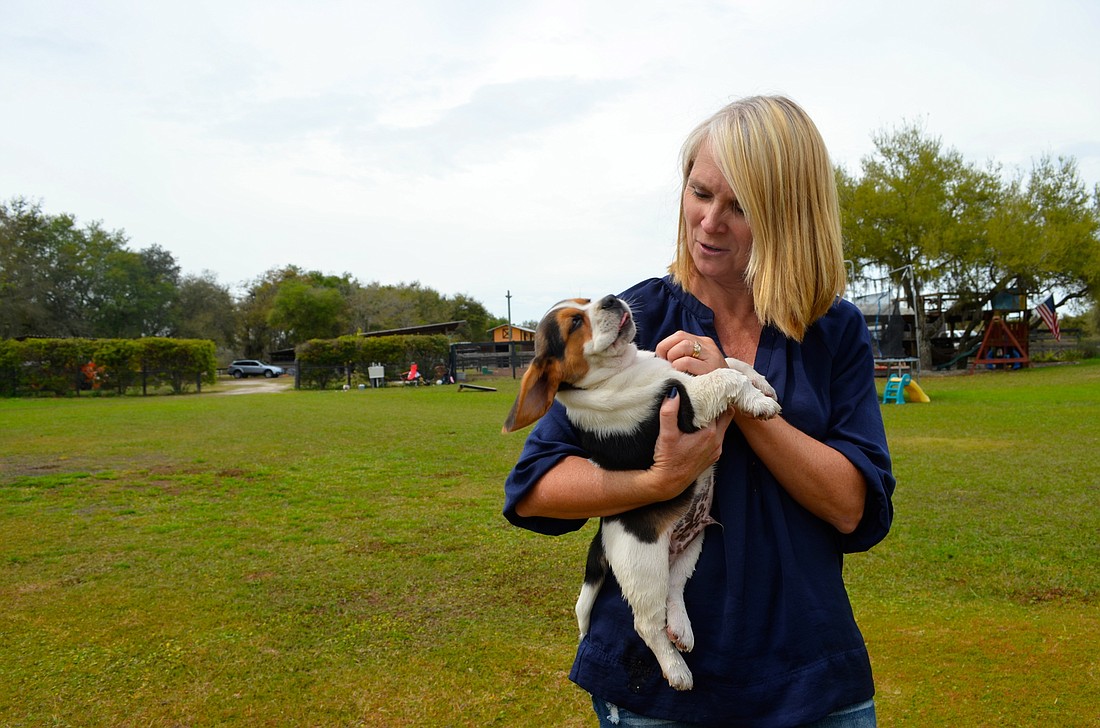- February 4, 2026
-
-
Loading

Loading

Paw sniffs the grass surrounding a pond in Heather Junqueira’s backyard. Within a few seconds, the mischievous 10-week-old beagle dives into the water and tests his swimming skills, or lack thereof.
Paw and his sister, Hazel, could soon use their noses to sniff out more than just the scents in their backyard. Their noses could become a tool in the early detection of cancer.
Last week, Junqueria’s Myakka-based organization, BioScent K9, received its 501(c)(3) nonprofit certification status. She
They see through their noses; it’s like they see in color. So, if you tell someone a dog with a 90% accuracy rating detected cancer, that holds weight. — Susan Nielson
hopes to teach the dogs to detect cancer so that, eventually, the canines could be used as an FDA-approved early cancer-detection method.
The puppies are part of the first batch of dogs Junqueira and BioScent K9 dog trainer Susan Nielson will teach to detect five types of cancer — breast, colon, lung, ovarian and renal cancers.
People with cancer emit a certain smell that dogs can detect with training, Nielson said.
Should the local nonprofit organization become FDA-approved, the organization’s testing could be used during annual checkups.
“The process is similar to how a Breathalyzer works,” Nielson said.
A physician would collect a breath sample from the patient into a plastic collection device, which has gauze material inside to absorb the volatile organic compounds, or chemicals, in the patient’s breath.
The sample would be sent to BioScent K9’s laboratory in Myakka, and placed in a line-up with other samples. A group of five dogs trained to detect a specific type of cancer would sniff the samples.
If a dog detects cancer, it will notify Junqueira or Nielson by holding up its paw or sitting in front of the sample. After the doctor receives the results, he or she would decide if further traditional testing, such as a mammogram, is necessary.
Junqueira specifically chose beagles because of the breed’s strong sense of smell. She is working with a breeder to obtain up to 25 dogs that she will train in groups of five.
The project has special meaning for Junqueria and Nelson, both of whom have lost family members to cancer.
“Early detection is key,” says Junqueira, a veterinary technician. “It can drastically increase chances of survival. This program, these dogs, could change lives.”
She wants her group to offer a detection method that’s less threatening than many tests, although the dogs won’t replace mammograms or other types of testing.
Junqueira expects the program to cost $150,000 annually, in addition to startup costs of building kennels and other modifications to the backyard of her East County home, which will house the project. The cost also includes $100 per dog monthly for medications and other needs for the animals, plus veterinarian fees.
Junqueira’s long-term goals include building a training facility and testing center, developing a standardized training protocol for scent-detection dogs and creating a software program to track statistics of each dog and a database for scent-detection research.
The group hopes to work with local oncologists to obtain samples from individuals diagnosed with cancer but who haven’t started chemotherapy or other treatments yet. Nielson will “scent the dogs” by introducing them to different types of cancer. She’ll use samples obtained from patients and will put the cancer “smell” on the dogs’ toys.
After the dogs have been trained to detect the cancer “smell,” a process that takes more than five months, the women will test the dogs’ abilities by giving them a mixed batch of cancer and non-cancer samples.
Although the organization is using beagles, all dogs possess the necessary component to detecting cancer: their noses.
“Dogs use their sense of smell like we use our vision, to see things and learn about surroundings,” Nielson says. “They see through their noses; it’s like they see in color. So, if you tell someone a dog with a 90% accuracy rating detected cancer, that holds weight.”
For more information on the organization, email [email protected]. To make a donation, visit razoo.com and search BioScent K9.